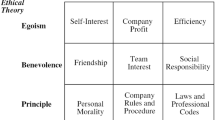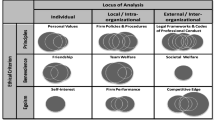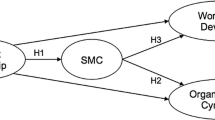Abstract
The purpose of this study was to determine if there is a relationship between the ethical climate of the organization and the development of person-organization fit. The relationship between an individual's stage of moral development and his/her perceived ethical work environment was examined using a sample of 86 working students. Results indicate that a match between individual preferences and present position proved most satisfying. Subjects expressing a match between their preferences for an ethical work climate and their present ethical work climate indicated that they were less likely to leave their positions.
Similar content being viewed by others
Reference
Bauman, R.: 1988, ‘It Isn't Stealing — Is It?’, Supervision, 49(1), 6–8.
Bernstein, P.: 1985, ‘Cheating — The New National Pastime?’, Business 35(4); 24–33.
Betz, M. and B. Judkins: 1975, ‘The Impact of Voluntary Associations Characteristics on Selective Attraction and Socialization’, The Sociological Quarterly 16, 228–240.
Buckley, J. P.: 1986, ‘Honesty, It's the Truth’, Security Management 30(6), 87–92.
Carter, R.: 1987, ‘Employee Theft Often Appears Legitmare’, Accountancy, 100(1127), 75–78.
Chatman, J. A.: 1989, ‘Improving Interactional Organizational Research: A Model of Person-Organization Fit’, Academy of Management Review 14(3), 333–349.
Clark, J. P. and R. C. Hollinger: 1983, Theft by Employees in Work Organizations (National Institute of Justice, Rockvill, MD).
Cook, J. D., S. J. Hepworth, T. D. Wall and P. B. Warr: 1981, The Experience of Work (Academic Press).
Dawes, R.: 1988, Rational Choice in an Uncertain World (Harcourt Brace Jovanocich, Orlando, FL).
Diener, E., R. Larsen and R. Emmons: 1984, ‘Person X Situation Interactions: Choice of Situations and Congruence Response Models’, Journal of Personality and Social Psychology 47, 580–592.
Emmons, R. and E. Diener: 1986, ‘Situation Selection as a Moderator of Response Consistency and Stability’, Journal of Personality and Social Psychology 51, 1013–1019.
Hall, D., B. Schneider and H. Nygren: 1970, ‘Personal Factors in Organizational Identification’, Administrative Science Quarterly 15, 176–190.
Jackson, S. E., R. S. Schuler and J. C. Rivero: 1989, ‘Organizational Characteristics as Predictors of Personnel Practices’, Personnel Psychology 42, 727–786.
Katz, D. and R. Kahn: 1978, The Social Psychology of Organizations (Wiley, New York).
Kohlberg, L.: 1984, The Psychology of Moral Development (Harper & Row Publishers, San Francisco).
McCrae, R. R.: 1985, ‘Review of the Defining Issues Test’, in J. V. Mitchell (ed.), The Ninth Mental Measurements Yearbook, (University of Nebraska Press, Lincoln), pp. 439–440.
Moreland, K. L.: 1985, ‘Review of the Defining Issues Test’, in J. V. Mitchell (ed.), The Ninth Mental Measurements Yearbook (University of Nabraska Press, Lincoln), pp. 440–441.
Porter, L. W. and E. E. Lawler: 1966, ‘Properties of Organization Structure in Relation to Job Attitudes and Job Behavior’, Psychological Bulletin 64, 23–51.
Rest, J. R.: 1979, Development in Judging Moral Issues. (University of Minnesota Press, Minneapolis).
Rothstein, M. and D. Jackson: 1980, ‘Decision-Making in the Employment Interview: An Experimental Approach’, Journal of Applied Psychology 65, 271–283.
Rosenthal, R. and R. Rosnow: 1991, Essentials of Behavioral Research: Methods and Data Analysis (McGraw-Hill, New York).
Rynes, S. L. and A. E. Barber: 1990, ‘Applicant Attraction Strategies: An Organizational Perspective’, Academy of Management Review 15(2), 286–310.
Schneider, B.: 1987, ‘The People Make the Place’, Personnel Psychology, 40, 437–453.
Seashore, S. E., E. E. Lawler, P. Mirvis and C. Cammann: 1982, Observing and Measuring Organizational Change: A Guide to Field Practice (Wiley, New York).
Sigelman, L.: 1975, ‘Reporting the Views: An Organizational Analysis’, American Journal of Sciology 79, 132–151.
Sims, R. L.: 1993, ‘The Relationship between Academic Dishonesty and Unethical Business Practices’, Journal of Education for Business 68, 207–211.
Sims, R. L. and K. G. Kroeck: 1994, ‘The Influence of Ethical Fit on Employee Satisfaction, Commitment and Turnover’, Journal of Business Ethics 13, 939–947.
Snyder, M., E. Berscheid and A. Matwyck: 1988, ‘Orientation Toward Personnel Selection: Differential Reliance Appearnace and Personality’, Journal of Personality and Social Psychology 54, 972–979.
Victor, B. and J. B. Cullen: 1988, ‘The Organizational Bases of Ethical Work Climates’, Administrative Science Quarterly 33(1), 101–125.
Walls, J. D., Jr.: 1988, ‘Putting a Premium on Honesty’, Security Management 32(9), 81–84.
Weiss, D. J., R. V. Dawis, G. W. England and L. H. Lofquist: 1967, Manual for the Minnesota Satisfaction Questionnaire (Industrial Relations Center, University of Minnesota).
Author information
Authors and Affiliations
Rights and permissions
About this article
Cite this article
Sims, R.L., Keon, T.L. Ethical Work Climate as a Factor in the Development of Person-Organization Fit. Journal of Business Ethics 16, 1095–1105 (1997). https://doi.org/10.1023/A:1017914502117
Issue Date:
DOI: https://doi.org/10.1023/A:1017914502117




